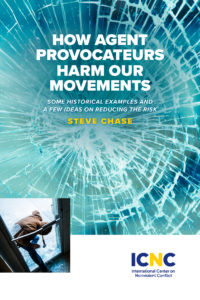Minds of the Movement
An ICNC blog on the people and power of civil resistance
by Steve ChaseDecember 06, 2021
Steve Chase presented an ICNC webinar entitled,
"How Agent Provocateurs Harm Our Movements—And What Can Be Done About It",
on January 18, 2022. Watch the recording here.
Several years ago, I was given a short activist training handout entitled “Ten Ways To Kill A Citizens Movement.” It was written by an experienced U.S. community organizer named Byron Kennard, and highlighted his top-ten list of unhelpful behaviors by sincere but misguided activists who unwittingly weaken our grassroots movements for peace, human rights, political freedom, social justice, and environmental sustainability. Kennard believed that spreading a little awareness of such counter-productive activist behaviors, and encouraging us to choose better ways of organizing could help us achieve more movement victories in improving people’s lives, building popular power, and diminishing the stranglehold of power elites over our lives.

How Agent Provocateurs Harm Our Movements, by Steve Chase (ICNC Press, 2021). Free PDF download here.
He took this strategic challenge seriously, but his piece was very funny—in a painful sort of way. What made Kennard’s piece so biting is how he humorously imagines the existence of enemies who wish to harm our movements in order to dramatize our own, all-too-common, mistakes. As he said in the set-up of the handout, “Suppose you want to kill a citizen movement and come to me for expert advice. I would suggest first that you join it and then proceed to follow these ten basic, simple rules, any one of which will drain the vitality out of a movement.” He then asks his readers why would any of us want to act like his fictitious enemies trying to harm our movements?
A hard truth not mentioned by Kennard, however, is that there actually are movement opponents who send fake activists undercover into movements as “agent provocateurs” to engage in behavior that will harm and disrupt our movements from within. This painful fact has been highlighted in some significant historical research, investigative reporting, and years of activist experience and observation. This repression strategy does not always work, but it has worked often enough for it to be a common practice of movement opponents around the world. World renowned activist-scholar Noam Chomsky has even said that the problem of agent provocateurs is “so routine there’s not even any point in giving examples.”
As a long-time activist, I don’t completely agree with Chomsky. Routine, yes; but the problem of agent provocateurs is still not very well-known or understood by many activists and organizers. Given that this lack of awareness increases a movement’s vulnerability to agent provocateurs, it is valuable to share some historical examples of agent provocateur activity from around the world. As a strategic matter, the negative impact of agent provocateurs on our movements must be understood. Effective strategies for inoculating our movements from their negative influence must be developed. In addition, studying the destructive behavior of agent provocateurs can also give us clues about similar behaviors by sincere activists who are more likely to weaken our movements and decrease our chances of success. Agent provocateurs can serve as a cautionary tale about how activists should not behave if they want to be effective.
This was actually my major motivation when I wrote my first article on agent provocateurs back in 2017. As I noted in that blog post, “There is simply no documented case that I know of where a paid undercover government or corporate agent has encouraged activists to engage in strategic civil resistance and maintain their nonviolent discipline doing it.” These agents simply do not see such movement actions as being in their interest. What they do see in their interest is magnifying existing weaknesses within movements, introducing new internal conflicts, fracturing coalition relationships by sowing divisiveness and distrust, causing scandals, and encouraging strategically counter-productive tactics like violence and unfocused property destruction. Indeed, agent provocateurs routinely yell at counter-demonstrators, punch them, break windows, burn cars, riot, and street fight with police. They have also sought to entrap sincere movement activists into even more destructive actions such as bombings, assassinations, and armed insurrections.
Why? Because they know that such tactics—whether engaged in by agent provocateurs or by sincere but misguided activists—tend to discredit the movement in the public eye, lessen popular participation, decrease defections from the oppressor’s pillars of support, and provide oppressive governments with a popular justification for using repressive violence against activists. Since not all sincere activists understand this, it was a good point to raise.
Given the significant interest in my blog post, I was inspired to provide more information on agent provocateurs and agent provocateur-like behavior. So, with the help of some of the staff and academic advisors of the International Center on Nonviolent Conflict, I began researching agent provocateurs more in-depth and drafted a manuscript entitled How Agent Provocateurs Harm Our Movements. This 52-page activist guidebook has now been published by ICNC Press and it is available as a free PDF download, a paperback, or e-book.
In this book, drawing from international examples and an in-depth case study of the U.S. Black Liberation Movement, I explore in detail how agent provocateurs—and agent provocateur-like behaviors—harm our movements and make them easier to defeat. It also offers some useful ideas for how activists can inoculate our movements against such negative influences and increase our chances of movement health and success. ICNC bloggers Farai Muguwu and Gabriel Dayley also offer practical insights on how movements can effectively counter co-optation in their May 2019 post.
Over the past ten years, a large amount of social movement research has shown that peoples’ movements are more likely to succeed when they have unity among supporters, widespread participation, strategic planning, and nonviolent discipline. It is not surprising, therefore, that agent provocateurs both instigate and encourage real activists to behave in ways that undermine these four keys to movement success. Our challenge is to learn not to take the bait. Why would any of us want to act like agent provocateurs who are trying to harm our movements?

Steve Chase
Steve Chase is a long-time activist, educator, and writer and previously worked as Manager of Academic Initiatives for ICNC. He is currently the Assistant Director of Solidarity 2020 and Beyond, a solidarity network and community of practice for grassroots movement organizers in the Global South using advocacy, peacebuilding, and nonviolent resistance to win sustainability, rights, freedom, and justice.
Read More